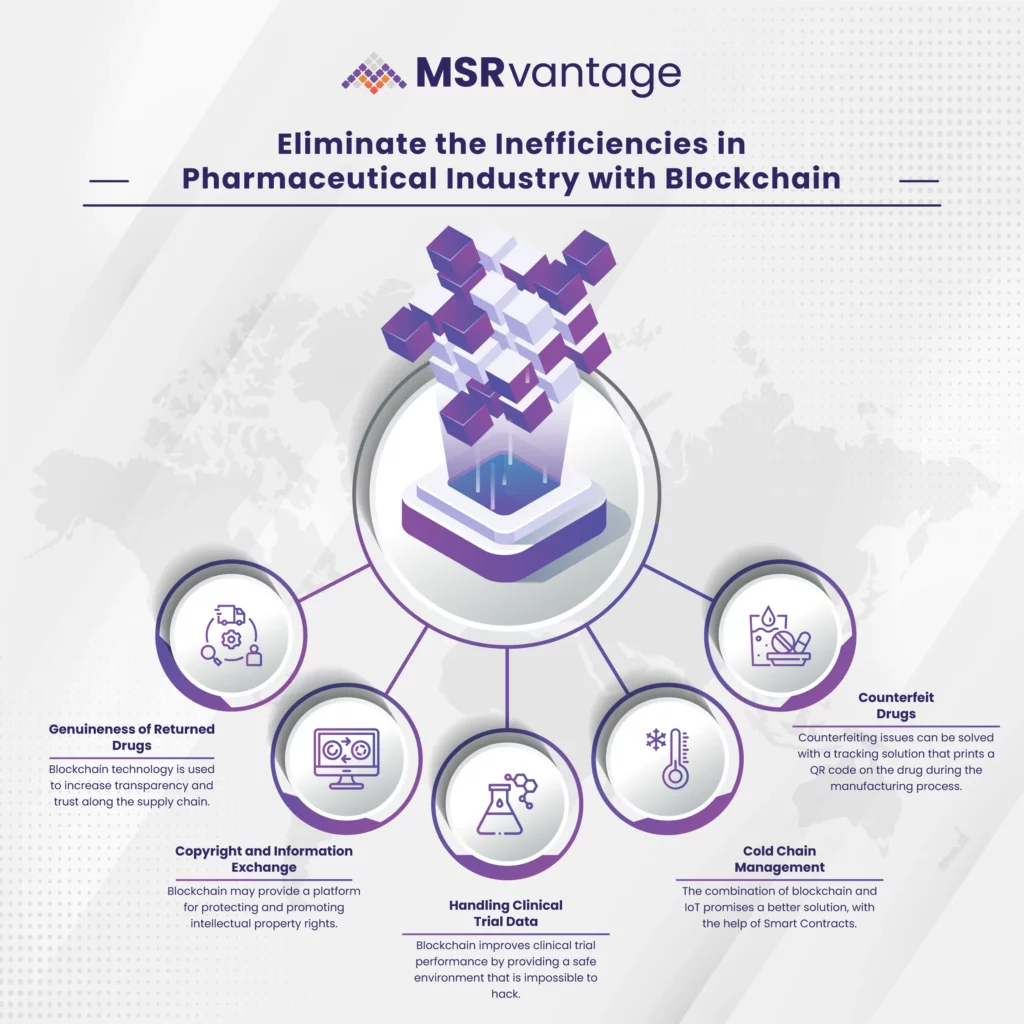The pharmaceutical industry is undergoing massive changes. Historically this industry slows to adopt the technology. Now, this industry is undergoing dramatic transformations with the emergence of several advanced technologies. Blockchain is among the prominent pharma trend in this industry. Increased investments, the growth of technology, increased inter-organizational collaborations, and a favorable regulatory environment are all driving pharmaceutical industry innovation.
MSRvantage addressed supply chain threats and risks by using pharmaceutical Track and Trace solutions. It guides pharmaceutical companies to safely collaborate in a shared, permanent ledger with a blockchain. It can also lower prices to make easier and faster transactions and verify what is true whenever a workflow spans competing organizations. Consumers can do transactions without giving up control or even disclosing their data in the network. A formal proof of data can continue serving as a reliable proxy for actual data. Blockchain in the pharmaceutical industry can not be owned and managed by a single company. This distributed ledger is governed by all network participants. Blockchain technology in the pharmaceutical industry to prevent counterfeit drugs, reduces friction and ensures product factual accuracy at an unprecedented rate.
Based on the number of benefits provided by blockchain technology in pharma, it has a broad range of applications. Let’s take a view on how blockchain in the pharmaceutical industry is making its root
1. Acknowledging the genuineness of returned drugs: A pharmacy’s primary goal is to organize and distribute appropriate products to customers who will buy and use them. Due to product expiration, pharmacies are required to return the product. This process is known as reverse distribution. Here products are transferred from their final destination to their origin to capture value, repair a defect in the product, or extend the product’s life. Transportation must be paid twice in such a case. It also includes the costs of correcting invoices, inspecting products, and issuing refunds. Currently, a third party is determining the amount of unsalable inventory in warehouses, collecting unsalable, expired drug products from pharmacies. Returning those drugs to manufacturers and wholesalers brought up the issue of re-authentication of returned drugs. Pharmaceutical Track and Trace solutions are required to re-authenticate this process
Solution: Blockchain in the pharmaceutical industry has emerged as a novel approach to establishing trust in a trustless environment, as well as ensuring data integrity, availability, traceability, and security in data management, and it represents a valuable solution to the revenue distribution process. Blockchain technology is used to increase transparency and trust along the supply chain. This is accomplished by introducing a new Track and Trace solution that uses blockchain technology to integrate the entire supply chain in an application suite, from the supplier to the customer. For reverse logistics, the blockchain in the pharmaceutical industry is used as a communication message. The benefit of the Track and Trace solution is that by storing all information in a blockchain, the operation of transferring them to the supplier is made without any additional cost or difficulty.

2. Copyright and information exchange
Improving invention processes, storing patent/intellectual property information and rights, and capturing electronic data are all extremely risky. Patent filing and storage, as well as proprietary data protection, are both time-consuming and expensive processes. Furthermore, global facilitation and monitoring of this process are difficult.
Solution: Blockchain in the pharmaceutical industry has the potential to provide a platform for the protection and facilitation of intellectual property law, including the facilitation of licensing fees, payments, and incentivization models that could encourage participants to contribute to the research and development process. Decentralization, an immutable ledger, and the ability to build in the necessary controls and governance while connecting to the appropriate authorities would provide the necessary trust and transparency to enable network participants in the drug development process to collaborate across borders. This collaboration of synergized development, tracking, and reporting results in faster breakthroughs and a faster overall process to save time and money for all participants.
3. Handling clinical trial data
The research team faces numerous difficulties when it comes to establishing trust and transparency in clinical data. The massive amounts of data generated in clinical trials, combined with globalization and increasing restrictions, are outstripping persistent data platforms’ ability to manage the competing needs of data sharing, patient privacy, and data integrity. Many aspects of clinical research are suffering as a result of, a lack of platforms that are both secure and transparent enough for effective, trustworthy data distribution. Modern clinical trials face significant challenges in terms of reproducibility, regulatory approval, data integrity, data sharing, privacy concerns, and patient enrolment.
Solution: Blockchain in the pharmaceutical industry improve clinical trial performance. The platform’s nature is immutable, ensuring that clinical trials and protocols are strictly maintained and adhered to. This platform provides a safe environment that is impossible to hack. As a result, it can give trial participants more confidence, and they will be more eager to participate in studies of new drugs. The system remains secure because it distributes data across multiple parties. It is nearly impossible to decode the block’s hash. Even if a portion of the architecture is compromised, the information will not be lost. This data is held by other parties too. As a result, it can ensure the confidentiality and accuracy of clinical trial data. In addition, stakeholders can establish public registries to gain access to clinical trial results.
4. Cold chain management
Certain medicinal products are stored in the refrigerator all the way from the manufacturing company to the pharmacy. It is referred to as the cold chain.
Refrigeration was traditionally ensured by a driver manually. He is checking a temperature gauge throughout the shipping process.
Solution: The combination of blockchain and IoT promises a better solution. Internet-connected sensors can be installed inside pharmaceutical shipping containers or trucks. These sensors can take temperature readings on a regular basis and send them to a smart contract, which can store them on the blockchain. If a temperature reading exceeds a certain threshold, the smart contract can perform a variety of actions. It can send an alert to the shipping company, instructing them to take action to bring the temperature back down. If a high temperature is maintained for an extended period of time, a batch of pharmaceuticals may be ruined. Here, the smart contract may withhold payment to the shipping company for that shipment.
5. Counterfeit drugs
Piracy and counterfeiting have affected nearly every product in this era, including medicines and drugs. Over the last several years, the global pharmaceutical industry has faced an increase in the threat of counterfeit drugs.
Solution: The problem of counterfeiting drugs and tracking them can be solved by pharmaceutical Track and Trace solutions that imprint QR codes on drugs during the manufacturing process. This model is based on a decentralized system in which the manufacturer creates a drug and uploads the details to a blockchain. Following that, the drugs will be approved by the government. Following that, hospitals and pharmacies can request the available approved drugs based on their needs. In the future, if a patient requires medication, one must make a request on the blockchain network, and the request will be routed to the nearest hospital/pharmacy, where the patient will be able to collect the necessary drugs. Blockchain technology in the pharmaceutical industry to prevent counterfeit drugs will be surely a game-changing solution.
Recent posts


Cultivating Sustainability: The Role of Traceability Solutions in Revolutionizing Agriculture Practices
In an era where the global population is on the rise and environmental concerns are at the forefront of discussions, the need for sustainable agricultural
Read more 


Transforming Mining: Risk Mitigation with Blockchain Technology
The mining industry is essential to modern life, providing the raw materials for everything from smartphones to infrastructure projects. However, it's also known for its
Read more 


The Power of Supply Chain Mapping Using Blockchain in Mining
The mining industry is a complex and critical sector that forms the backbone of many global supply chains. It encompasses the extraction, transportation, and processing




